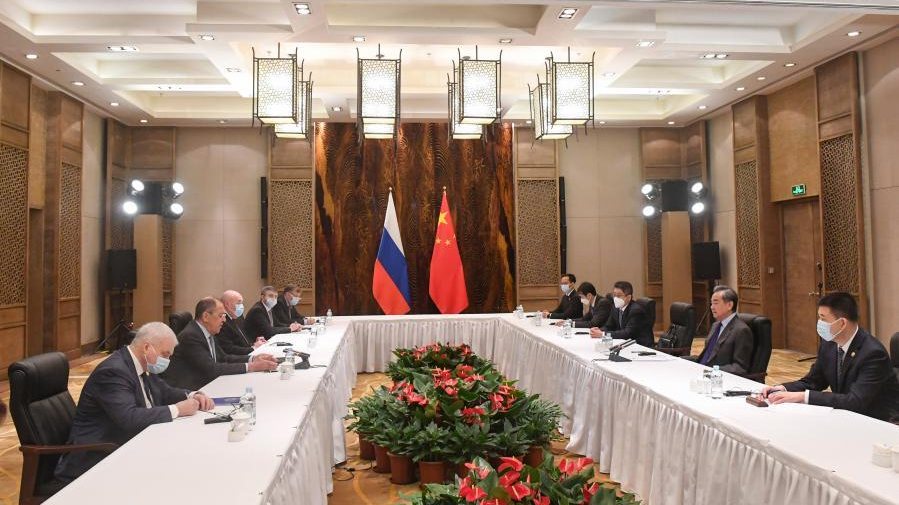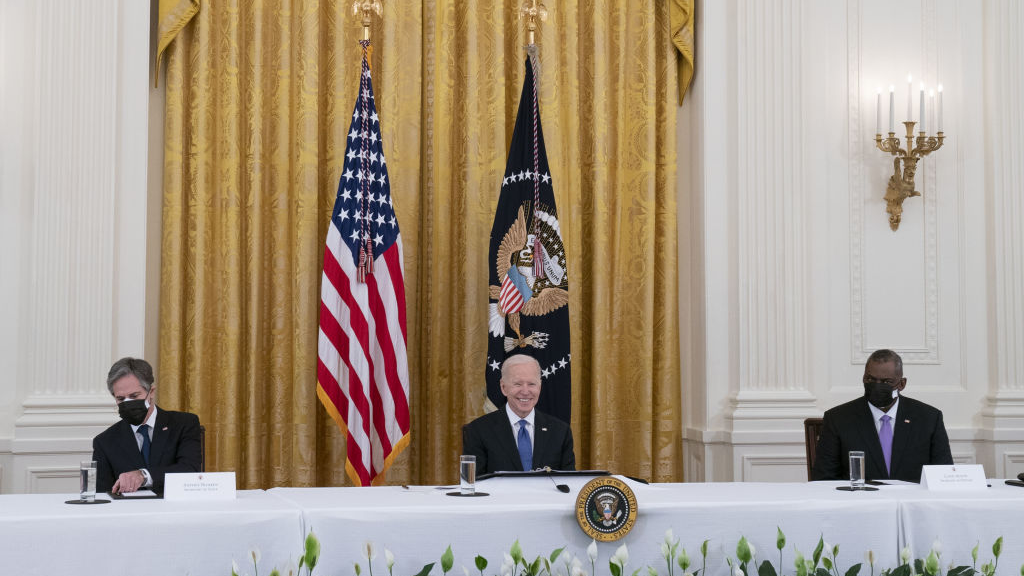
Chinese State Councilor and Foreign Minister Wang Yi meets with Russian Foreign Minister Sergei Lavrov in the city of Guilin, south China's Guangxi Zhuang Autonomous Region, March 23, 2021. /Xinhua
Chinese State Councilor and Foreign Minister Wang Yi meets with Russian Foreign Minister Sergei Lavrov in the city of Guilin, south China's Guangxi Zhuang Autonomous Region, March 23, 2021. /Xinhua
Editor's note: Danil Bochkov is an expert with the Russian International Affairs Council. He graduated cum laude with a master's degree in economics from MGIMO-University under the Ministry of Foreign Affairs of Russia and a master's degree in world economy from the University of International Business and Economics in China. The article reflects the author's opinions and not necessarily the views of CGTN.
Russia and China have been at the center of the U.S.-EU blame game for quite some time, especially with recent intensification of tensions following military build-up in the South China Sea and on the Russian border with Ukraine.
Beijing has been blamed for heightening contention and "aggressive moves" in the sea while Moscow got rebuked for "provocations" on the border with Ukraine. Both countries claim their actions to be responsive to the external forces' provocations and threats, which are represented by the U.S. in China's case and NATO in Russia's.
Moscow has been facing growing friction with the West from early April following military concentration on the Ukrainian border. It triggered criticism in the West and NATO with calls for Moscow to reduce its troops build-up. Washington went on threatening the Kremlin with sanding warships to the Black Sea, which was cancelled later but initially was supposed to add more tension to the conflict, since Moscow feels a serious risk of "resumption of full-scale military action" meaning "beginning of the end" for Ukraine. Anticipating American warships' arrival Russian navy preemptively launched drills in the Black Sea with participation of naval aviation and helicopters.
In a clear sign of degrading ties with Moscow, U.S. President Joe Biden gave green light to new batch of anti-Russia sanctions officially dubbed as "imposing costs for harmful foreign activities" by Russia in response to interference and cyber-attacks against the U.S., "ongoing occupation of Crimea" and disrupting security in countries crucial for the U.S. national security.
New round of restrictions became tougher, since it targets Russian sovereign debt for the first time. However, it seems more as a perfunctory measure by prohibiting U.S. financial institutions from buying just newly issued ruble bonds not all the others.
Russia is not the only "threat" for the U.S. – China is seen as even greater danger as argued by the newly published U.S. Intelligence report. U.S. gathers allies in Asia to counter China similarly to promoting NATO as a prime bulwark against Moscow. In order to push back against China – Biden's administration focused on reestablishing partnership networks in the Indo-Pacific.
Washington's European associates also intensified their regional activities, as exemplified by Quad members, for the first time by joining India-led "La Perouse" maritime drills on April 5. France is not the only European nation who has been expanding presence in Asia-Pacific followed by intensified interactions with the U.S. and its regional allies.
On April 14, Japan and Germany in 2+2 format discussed issues of common concern pertaining mostly to China's regional activities. Japan recast itself as a steward against China's growing military might in the region with its foreign minister blaming Beijing for "unilateral efforts" aimed at changing regional "status quo by force." Berlin has followed the footsteps of its two other allies – London and Paris who has established 2+2 format with Tokyo some time earlier with both sharing Japan's anxiety about China.
In a recently wrapped-up Japan-U.S. leaders' summit China became top agenda with President Biden and Japanese Prime Minister Suga vowing to further cooperation and ally against a wide range of "challenges" posed by China – a commitment already criticized by official Beijing as "harming China's interests." Now the EU has produced its first-ever Indo-Pacific strategy aimed at boosting regional presence through more active trade, investment, climate change, security and defense.
Although the paper is missing China – it is considered to be designed to counter Beijing collectively with the American allies. Washington has recently upped the ante in the regional affairs and framed China as "strategic competitor to the U.S." in its fresh Strategic Competition Act of 2021. In a face of Russia-China foreign policy maneuvers – Antony Blinken on April 18 voiced "real concerns" about Russian forces buildup and warned China of committing a mistake launching attack on Taiwan.

U.S. President Joe Biden smiles during a cabinet meeting in the East Room of the White House in Washington, D.C., U.S., April 1, 2021. /Getty
U.S. President Joe Biden smiles during a cabinet meeting in the East Room of the White House in Washington, D.C., U.S., April 1, 2021. /Getty
Beijing and Moscow feeling mounting Western pressure exhibited "united front" against Western sanctions and U.S. attempts to "take a superior position globally" – a phrase coined by Chinese Foreign Minister Wang Yi echoing Sergey Lavrov's earlier remark about "worthless Western politicians" trying to "speak to China and Russia downrightly." China's Foreign Ministry called new U.S. unilateral sanctions against Russia as "hegemonic bullying," which were rejected by the international community.
In earlier April, Moscow and Beijing feeling growing pressure highlighted their vibrant relations, when Chinese Foreign ministry reassured prospects of Moscow-Beijing comprehensive strategic coordination, which "will only be stronger and broader." It becomes relevant against the backdrop of Biden's recent proposal of 1.7 percent increase in its 2022 defense budget to "counter the threat from China" and "deterring destabilizing behavior by Russia."
China's President Xi Jinping in his welcoming remarks for the opening of United Russia – Communist Party of China Dialogue on April 20 stressed that both states are developing "the concept of friendship transmitted from generation to generation and … have created a classic model of modern relations between world powers."
Very vibrant interaction between Moscow and Beijing as well as their joint actions, which – as President Xi Jinping noted – produce "an important impact on the situation in the world," are met with huge concerns in the United States.
Two recent publications in the leading U.S. media – CNBC and FP see China-Russia cooperation as "Biden's defining challenge as president," which could "complicate [his] administration's plan to reassert U.S. leadership." It might become true if the U.S. doesn't change its antagonistic approach to China and Russia opting for more cooperation as exemplified by Biden's recent overtures to Putin and recent climate change talks between Washington and Beijing.
(If you want to contribute and have specific expertise, please contact us at opinions@cgtn.com.)

